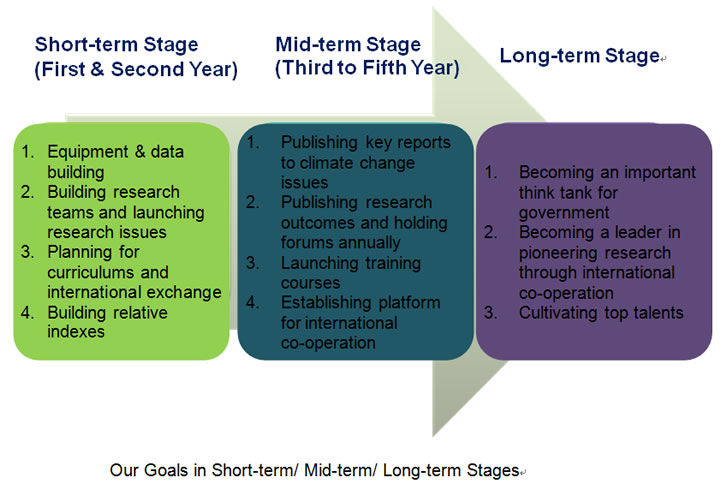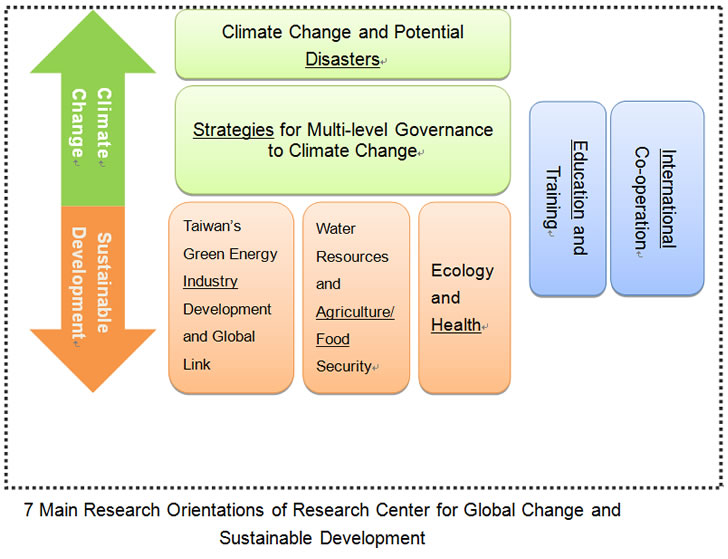I. Preface
National Taiwan University, according to the resolution of the 2674th University-Affair meeting in June 21st, 2011, approved to establish Research Center for Climate Change and Sustainable Development to integrate relative human forces and resources, and to facilitate inter-disciplinary co-operation, so as to focus on Taiwan’s challenges and issues, to design research orientations for important issues, to research on complete strategies for national climate governance, and to define different roles that governmental organizations and citizens shell play. We aim at proposing concrete outcomes, and becoming an important consultant for policy making, and furthermore, assisting relative industries to form a firm basis in global markets, and ultimately elevating Taiwan’s national competency.
II. Goals
This center is established to integrate and elevate NTU’s research in climate change and sustainable development, and to a build a research team of world-class excellence, so as to be in response to demands for development and to assist government, enterprises and non-governmental organizations to realize relative policies and technology applications.
A. Missions
a. Analyzing risks and impacts of climate change and proposing policies for sustainable development in social and economic aspects
b. Establishing system models in economy, ecology and energy to support policy-making for adaptations for climate change
c. Publishing key reports for policy makers so as to be a leader toward a low-carbon future
B. Promotion Strategies
a. Integrating Existing Resources
To promote a platform and to input research capacity in various research orientations, we set up our goals in short-term, mid-term and long-term phases as above. Our ultimate goal is to cultivate top talents, to be an important think tank for government, and to be a leader in international pioneering issues
National Taiwan University, according to the resolution of the 2674th University-Affair meeting in June 21st, 2011, approved to establish Research Center for Climate Change and Sustainable Development to integrate relative human forces and resources, and to facilitate inter-disciplinary co-operation, so as to focus on Taiwan’s challenges and issues, to design research orientations for important issues, to research on complete strategies for national climate governance, and to define different roles that governmental organizations and citizens shell play. We aim at proposing concrete outcomes, and becoming an important consultant for policy making, and furthermore, assisting relative industries to form a firm basis in global markets, and ultimately elevating Taiwan’s national competency.
II. Goals
This center is established to integrate and elevate NTU’s research in climate change and sustainable development, and to a build a research team of world-class excellence, so as to be in response to demands for development and to assist government, enterprises and non-governmental organizations to realize relative policies and technology applications.
A. Missions
a. Analyzing risks and impacts of climate change and proposing policies for sustainable development in social and economic aspects
b. Establishing system models in economy, ecology and energy to support policy-making for adaptations for climate change
c. Publishing key reports for policy makers so as to be a leader toward a low-carbon future
B. Promotion Strategies
a. Integrating Existing Resources
- Aiming at being a university-level platform for interaction to integrate internal resources and manpower, and to provide a top research environment
- Integrating research outcomes to elevate teaching quality, and enhancing cultivation for top talents
- Taking Taiwan as a research field, and promoting frontier researches on climate change and sustainable development
- Encouraging opportunities for research co-operation between each research orientation, promoting collaborated research works among disciplines and across boundary between humanities and natural sciences, and improving the theoretical level and scope of application
- Facilitating collaboration among domestic colleges and universities, research institutes (such as Academia Sinica, Chunghua Institute for Economic Research, and etc.), industry associations, and foundations
- Playing an active role in co-operation and exchange with international research institutes and world’s top universities
- Holding academic and citizen forums to disclose research outcomes and to enable actual opinion exchange
- Publishing key reports to provide professional suggestions to climate change and sustainable development issues
To promote a platform and to input research capacity in various research orientations, we set up our goals in short-term, mid-term and long-term phases as above. Our ultimate goal is to cultivate top talents, to be an important think tank for government, and to be a leader in international pioneering issues
III. Organization
In the first stage, we set up seven development orientations to cover key issues on climate change and sustainable development; there are seven teams as illustrated above, including “Climate Change and Potential Disasters”, “Strategies for Multi-level Governance to Climate Change”, “Taiwan’s Green Energy Industry Development and Global Link Strategies”, “Water Resources and Agriculture/Food Security”, and “Ecology and Health”; to take human resource development into account and to expand influence, “Education and Training” and “International Co-operation” are included as well. In order to meet actual social and economic requirements, now we are working out on the eighth orientation, that is, a team for “Society and Economy”. Furthermore, we will add other teams for proper projects in response to research or national development requirements, or adjust and merge different teams to meet the high expectation from our society.
In the first stage, we set up seven development orientations to cover key issues on climate change and sustainable development; there are seven teams as illustrated above, including “Climate Change and Potential Disasters”, “Strategies for Multi-level Governance to Climate Change”, “Taiwan’s Green Energy Industry Development and Global Link Strategies”, “Water Resources and Agriculture/Food Security”, and “Ecology and Health”; to take human resource development into account and to expand influence, “Education and Training” and “International Co-operation” are included as well. In order to meet actual social and economic requirements, now we are working out on the eighth orientation, that is, a team for “Society and Economy”. Furthermore, we will add other teams for proper projects in response to research or national development requirements, or adjust and merge different teams to meet the high expectation from our society.


